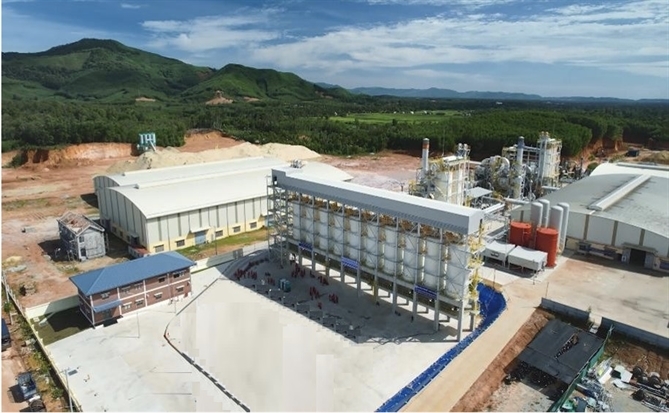Logistics sector supports Vietnam’s economic growth despite pandemic
_16137119.png)
According to the latest survey of SSI, Vietnam’s logistics sector’s stocks grew 94% in 2021 despite the impact of the COVID-19 pandemic. How do you think about this result given the global supply chain crisis and economic turbulance in the past year?
Connections are essential to keep the world moving. During this pandemic, our industry has proven to be absolutely critical in delivering, whether it is critical healthcare shipment, business to business or e-commerce to consumers.
Not only have we been able to minimise the impact caused by the COVID-19 related uncertainties, but we’ve also made the most significant network expansion in the region with the launch of six new flights enhancing connectivity and service reliability for Asia Pacific businesses to the U.S. and Europe, adding nearly 2,700 tons in capacity each week.
What were the challenges that Vietnam’s logistics industry faced and overcame in 2021?
2021 was a year of disruptions for Vietnam as the pandemic caused many businesses to suspend their activities including those located in the country’s biggest and busiest industrial hubs such as Hai Duong, Ho Chi Minh City, Binh Duong, Long An and Vinh Phuc.
Fortunately, we witnessed collective efforts to combat the pandemic by the government of Vietnam, enterprises of all sizes as well as front-line doctors and soldiers.
Looking ahead, we are optimistic that Vietnam is on the path to recovery. In January 2022, Vietnam was among the six countries with the highest vaccination coverage rate in the world. Vietnam's economy recorded a breakthrough in the fourth quarter of 2021 — an increase of 5.22%, an impressive reversal from the previous quarter’s decline (-6.02%), which brought the GDP for the whole year up to 2.58%.
_16137948.png) |
What are the impacts that the global supply chain crisis has casted on Vietnam's logistics industry?
One of these changes is a shift from a just-in-time supply chain model to one that builds in contingencies and stops businesses from getting caught short without stock or supplies, the just-in-case supply chain model. Increasingly businesses are reviewing their supply chain resilience as many of the disruption and its effects are long-term.
Secondly, it highlights the importance of supporting Vietnam businesses for recovery and seek opportunities in the global supply chain. We need to continue improving Vietnam’s connectivity through developing and strengthening our transport infrastructure for air, land and sea routes. An example includes establishing more modern logistics hubs across the country, especially in strategic cities and provinces. Through better access, we can optimize supply chains and circulation of goods, while reducing costs and improving the competitiveness of businesses and the Vietnamese economy.
What strategies did FedEx adopt to fight against the pandemic and support growth?
In addition to our efforts to support the fight against COVID-19, we are also introducing e-commerce solutions to help Vietnam small and medium enterprises to trade across borders in a way that was never possible before.
The pandemic has shifted consumer behavior greatly. E-commerce is now booming — a trend with Asia as the leader globally. Vietnam’s digital economy is forecast to grow to $52 billion by 2025, an annual 29% increase from 2020. One way we’re helping them on this journey is by streamlining the e-commerce ecosystem.
As an essential service provider, we recognize one of the most important roles logistics can play during the pandemic is delivering critical aid. Since the start of the pandemic, we have been an essential service provider and have transported more than 14,000 COVID-19 humanitarian aid shipments throughout the world.
In September 2021, we donated a flight to transport 100,000 vaccines and test kits from Hungary to Vietnam. Through collective efforts to combat the virus, logistics is helping local communities, businesses and economies recover and move forward.
What are the new logistics trends in 2022, given that the pandemic is under better containment now?
The pandemic-induced boom in e-commerce will continue to be a powerful engine of the global economy. Vietnam’s business-to-consumer e-commerce sales grew by 18% to $11.8 billion in 2020, accounting for 5.5% of the country’s total retail sales and service revenue. The demand for cross-border e-commerce is expected to continue even post-pandemic in Vietnam and in the region.
In our recent FedEx white paper, “E-commerce Megatrends to Watch”, we identified some of the most significant drivers of e-commerce and analyzed the implications for e-commerce enterprises and logistics.
One of these trends is making online shopping a more ‘connected’ experience across platform. Mobile-commerce and social-commerce hold huge growth opportunities for e-tailers to connect with consumers in a more personalized and engaging way – something that consumers today desire. But success depends on innovative logistics models that can ensure smooth end-to-end shopping experiences.
And, there’s opportunity for businesses to cash in on the rise of the ‘sharing economy’. Powered by improved internet connectivity, consumers’ search for greater access and convenience in daily life have moved beyond bikes and taxis.
Through enhanced connectivity, on-demand services, and shared economy, a new era of e-commerce is here – opening up new possibilities for even the smallest businesses to compete on the global stage.
What role will Vietnam play in the global logistics industry according to the new 2022 trends?
We see significant potential for Vietnam to participate in the global supply chain in 2022. The country has a large population of well-educated and young workforce to support a strong manufacturing investment and processing industry as well as a growing middle-class.
Moreover, Geographically Vietnam is located in close proximity to some of fastest growing economies in South East Asia. As a member of the ASEAN, Vietnam can tap into rich opportunities in these markets. The recent Free Trade Agreements that have come into effect, such as the CPTPP, EVFTA, and RCEP, the world's largest free trade agreement, can boost investment access and freer trade with these trading partners.
These FTAs allow Vietnam to take advantage of reduced tariffs and at the same time attract companies to relocate or expand manufacturing in Vietnam and export to partners throughout ASEAN. Improved trading access will offer greater opportunities to Vietnam businesses including SMEs.
Most importantly, there is significant opportunity for Vietnam businesses to grow through e-commerce demand. According to the Vietnam E-commerce Association, the COVID-19 pandemic has sped up the progress of e-commerce development by one to two years, compared to Vietnam’s initial goal for 2025. With the growth rate of e-commerce at about 30-35% per year.
To help businesses make the most of these opportunities, logistics is key as it sits at the intersection of this physical and digital world. To support Vietnam businesses to grow with e-commerce, FedEx is investing and optimizing our air and ground network to improve connectivity.
Whether it is launching new digital tools to make shipping easier or adding new flights with more capacity to move more cargo, we are ready to support Vietnam move forward and prepare for what’s next.

 TIẾNG VIỆT
TIẾNG VIỆT 


_41635620.png)












